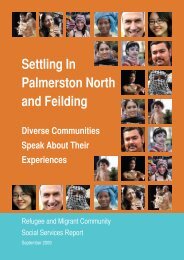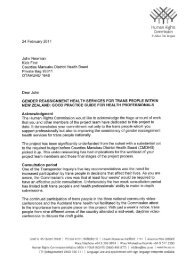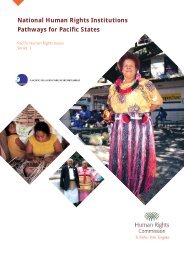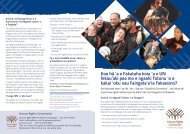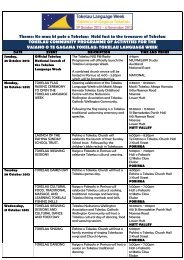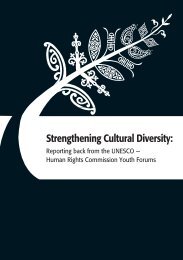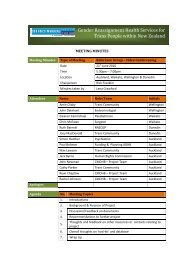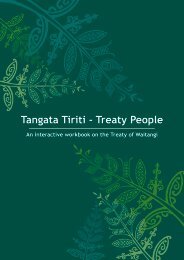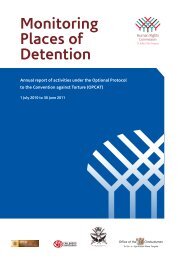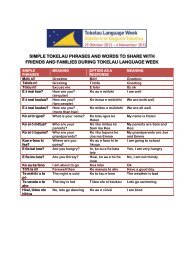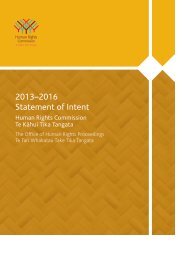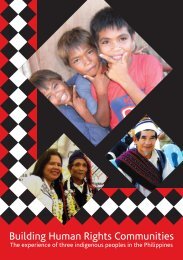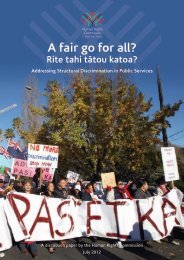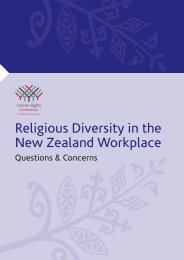Across the Post-Colonial Divide: Reflections on the Treaty of Waitangi
Across the Post-Colonial Divide: Reflections on the Treaty of Waitangi
Across the Post-Colonial Divide: Reflections on the Treaty of Waitangi
Create successful ePaper yourself
Turn your PDF publications into a flip-book with our unique Google optimized e-Paper software.
Ruth DeSouza<br />
Cultural safety<br />
• Developed by Māori nurses in <str<strong>on</strong>g>the</str<strong>on</strong>g> 80’s.<br />
• C<strong>on</strong>ceptual framework for understanding power<br />
inequalities structuring relati<strong>on</strong>ships and<br />
practical strategies.<br />
• Requires that all human being receive care that<br />
takes into account <str<strong>on</strong>g>the</str<strong>on</strong>g>ir uniqueness (culture,<br />
gender, religious backgrounds)<br />
• Not a checklist <strong>of</strong> customs or practices<br />
• Focused <strong>on</strong> knowledge and understanding <strong>of</strong><br />
<str<strong>on</strong>g>the</str<strong>on</strong>g> individual nurse/midwife<br />
• Important to understand <strong>on</strong>e’s own culture and<br />
<str<strong>on</strong>g>the</str<strong>on</strong>g>ory <strong>of</strong> power relati<strong>on</strong>s<br />
Four principles<br />
• Improve <str<strong>on</strong>g>the</str<strong>on</strong>g> health status <strong>of</strong> New Zealanders<br />
(<strong>Treaty</strong>, access, health gain <strong>of</strong> marginalised<br />
groups).<br />
• Enhance <str<strong>on</strong>g>the</str<strong>on</strong>g> delivery <strong>of</strong> services through a<br />
culturally safe workforce (power relati<strong>on</strong>ships,<br />
empowering users, understanding diversity in<br />
own c<strong>on</strong>text and <str<strong>on</strong>g>the</str<strong>on</strong>g> impact <strong>of</strong> that, going<br />
bey<strong>on</strong>d tasks to relati<strong>on</strong>ships).<br />
• Broad applicati<strong>on</strong> recognising impact <strong>of</strong> c<strong>on</strong>text<br />
(inequalities as a microcosm, impact <strong>of</strong> history,<br />
employment etc, legitimacy <strong>of</strong> difference,<br />
attitudes as barriers, quality improvement and<br />
rights).<br />
• Close focus <strong>on</strong> individual nurse (culture bearer,<br />
power relati<strong>on</strong>ships which favour providers,<br />
balancing power differentials, moving towards<br />
equitable delivery and minimising risk to<br />
marginalised).<br />
Simply put<br />
• Culturally safe<br />
• Recognise<br />
• Respect<br />
• Rights<br />
Implementati<strong>on</strong><br />
• <strong>Treaty</strong> <strong>of</strong> <strong>Waitangi</strong> pivotal for resource allocati<strong>on</strong><br />
for Maori.<br />
• Compulsory in nursing educati<strong>on</strong> for <str<strong>on</strong>g>the</str<strong>on</strong>g> last ten<br />
years.<br />
• Driven by educati<strong>on</strong> providers ra<str<strong>on</strong>g>the</str<strong>on</strong>g>r than<br />
service providers with little impact <strong>on</strong> negative<br />
Maori health outcomes<br />
Steps<br />
• Cultural awareness: understanding that <str<strong>on</strong>g>the</str<strong>on</strong>g>re is<br />
difference.<br />
• Cultural sensitivity: alerts to <str<strong>on</strong>g>the</str<strong>on</strong>g> ‘legitimacy <strong>of</strong><br />
difference’ and to self-explorati<strong>on</strong>.<br />
• Cultural safety: enables safe service to be<br />
defined by those that receive <str<strong>on</strong>g>the</str<strong>on</strong>g> service.<br />
Health<br />
• Labels have implicati<strong>on</strong>s for resource allocati<strong>on</strong>.<br />
• MC and BC not mutually exclusive.<br />
• CS can hold both but has focused <strong>on</strong> Maori.<br />
• Need for expansi<strong>on</strong> <strong>of</strong> cultural safety.<br />
• Understanding self, <str<strong>on</strong>g>the</str<strong>on</strong>g> rights <strong>of</strong> o<str<strong>on</strong>g>the</str<strong>on</strong>g>rs and <str<strong>on</strong>g>the</str<strong>on</strong>g><br />
legitimacy <strong>of</strong> difference should prepare <str<strong>on</strong>g>the</str<strong>on</strong>g><br />
nurse to work with all people who are different<br />
from <str<strong>on</strong>g>the</str<strong>on</strong>g>mselves (Nursing Council).<br />
• Need for <strong>on</strong>going dialogue and discussi<strong>on</strong>.<br />
C<strong>on</strong>clusi<strong>on</strong><br />
• The ethical relati<strong>on</strong>ship needs to go both ways,<br />
try understanding our history our hopes and our<br />
dreams, make space for us.<br />
• The c<strong>on</strong>sumpti<strong>on</strong> <strong>of</strong> Indian ness needs to be<br />
supplemented with understanding <strong>of</strong> social,<br />
political, cultural and spiritual significance and<br />
political power.<br />
• Expand bicultural dialogue.<br />
• Need for intercultural engagement.<br />
• Need for a visi<strong>on</strong> <strong>of</strong> Aotearoa/New Zealand.<br />
• Develop multicultural policy that is sensitive to<br />
bicultural issues and Maori.<br />
• Cultural safety an example



